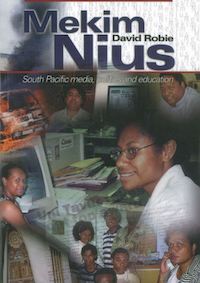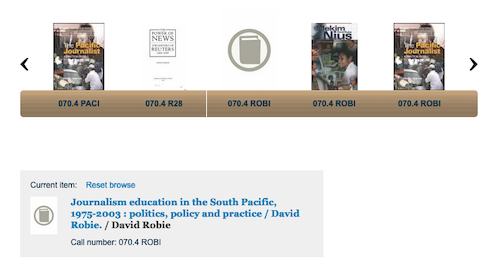By David Robie
University education for South Pacific journalists is a relatively recent development. It has existed in Papua New Guinea for merely a generation; it is less than a decade old at degree level in Fiji, and in the former colonies in Polynesia. At the same time, mean age, experience and educational qualifications have been rising among journalists in the major Pacific Islands Forum (PIF) member countries, Australia and New Zealand, as the news media has become more professionalised.

While the Papua New Guinea media has largely depended on journalism education to provide the foundation for its professionalism, Fiji has focused on a system of ad hoc short course training funded by international donors. This thesis examines the history of South Pacific university media education and its impact on the region’s journalism. Its first objective is to test the hypothesis that tertiary education has a critical influence on how Pacific journalists practise their profession and perceive their political and social role in a developing society faced with the challenges of globalisation.
Secondly, the thesis aims to analyse the political, economic and legal frameworks in which the media have operated in Papua New Guinea and Fiji since independence. Third, the thesis aims to explain and assess in detail the development of journalism education in the South Pacific since independence.
The theoretical framework is from a critical political economy perspective. It also assesses whether the concept of development journalism, which had its roots in the 1980s debate calling for a ‘New International Information and Communication Order’ (NWICO), has had an influence on a Pacific style of journalism.

The thesis argues within a context where journalists can be considered to be professionals with some degree of autonomy within the confines set by a capitalist and often transnational-owned media, and within those established by governments and media companies.
Journalists are not solely ‘governed’ by these confines; they still have some freedom to act, and journalism education can deliver some of the resources to make the most of that freedom.
The thesis includes historical case studies of the region’s three main journalism schools, Divine Word University (PNG), University of Papua New Guinea and the University of the South Pacific. It demonstrates some of the dilemmas faced by the three schools, student journalists and graduates while exercising media freedom.
Research was conducted using the triangulation method, incorporating in-depth interviews with 57 editors, media managers, journalists and policy makers; two newsroom staff surveys of 15 news organisations in Fiji and Papua New Guinea in 1998/9 (124 journalists) and 2001 (106); and library and archives study. It also draws on the author’s personal experience as coordinator of the UPNG (1993-1997) and USP (1998-2002) journalism programmes for more than nine years.
The thesis concludes that journalists in Papua New Guinea (where university education has played a vital role for a generation) are more highly educated, have a higher mean experience and age, and a more critically sophisticated perception of themselves and their media role in Pacific societies than in Fiji (where almost half the journalists have no formal tertiary education or training).
Journalists in Fiji are also more influenced by race, cultural and religious factors. Conversely, PNG journalists are poorly paid even when compared with their Fiji colleagues. There are serious questions about the impact that this may have on the autonomy of journalists and the Fourth Estate role of news media in a South Pacific democracy.
- Robie, D. (2003). Journalism education in the South Pacific, 1975-2003: politics, policy and practice.
[Two volumes, 908 pages, colour illustrations, maps]
(Doctoral thesis, University of the South Pacific, Pacific Collection, Suva, Fiji. Copy held at Auckland Public Libraries).
Thesis sequel, Robie, D. (2004). Mekim Nius: South Pacific Media, Politics and Education. Published by The University of the South Pacific Book Centre, Suva, Fiji. Open access available here.
Retrieved from USP (only Vol 1 available digitally, Vol 2 in Pacific Collection): http://pimrisregional.library.usp.ac.fj/gsdl/collect/usplibr1/index/assoc/HASH0179.dir/doc.pdf
Retrieved from Auckland Public Library (Pacific Collection, 2 vols).
Retrieved from AUT University (2 vols): http://hdl.handle.net/10292/4557
Retrieved from CORE – Aggregating the world’s open access research: core.ac.uk

